Three colleges came together to form CAFRE. Loughry college opened in 1908, Greenmount in 1912 and Enniskillen in 1967.
So historically, the organisation is over 100 years in the making. For those familiar with how Teagasc provide education the CAFRE model is similar, but the college director Martin McKendry explains, there is no research and CAFRE are within Government.
The staff are civil servants sitting within the food and farming group of the Department of Agriculture, Environment and Rural Affairs (DAERA). Their role is in the provision of education to young people, farmers and the food industry.
What do CAFRE do?
Martin believes that Government is all about changing behaviour and there are three ways to do that; regulation, incentive or the provision of knowledge.
“We deliver knowledge to young people entering the industry through further and higher education. We provide knowledge transfer (KT) and innovation to farmers and those working in the industry.”
College education
The college delivers courses from level two (equivalent to the junior cert) up to honours degree – the latter awarded and delivered in conjunction with one of the universities.
Courses at Greenmount include land based engineering, horticulture, food and floristry and veterinary nursing. Loughry has food technology, food business management, packaging, as well as a master’s in rural business.
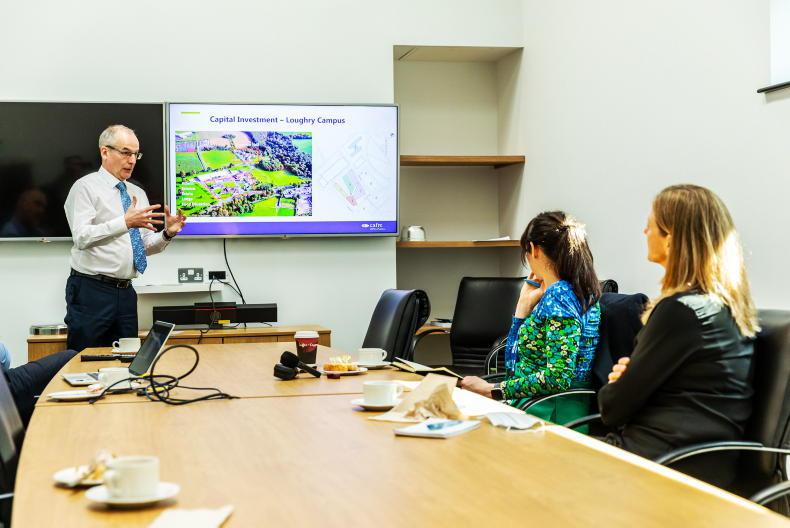
Martin McKendry College Director outlines the workd of the colleges 400 staff.
Enniskillen is horse care and farriery and agriculture on a part time basis. The college is particularly proud of its links with industry and the bursaries that flow from those relationships. Martin considers this a measure of success.
“We measure ourselves in terms of [getting] people into work, into jobs. We have 59 organisations delivering student bursaries. From Godolphin on the equine side to the food industry, ABP, Dale farm and agriculture Thompson’s and the Irish Farmers Journal and the Ulster Farmers Union.
It’s not just the £1000 bursary but the vast majority of these now offer a work placement along with it.”
Learner support
A new initiative, headed up by Fiona Dickson, head of learner services, commenced last year. This is to support the student experience while at college and after.
Fiona picks up: “This is everything from students seeking referrals or if they have any special requirements but also mental health and wellbeing, counselling and support to students when they are studying.
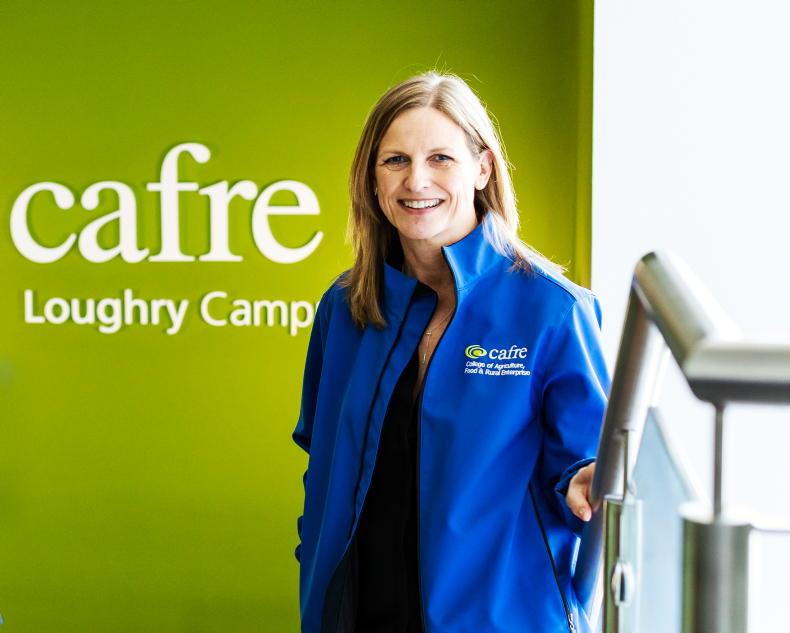
Fiona Dickson, head of Learner Services supports the student experience while at college and after.
“We do prepare our students to make sure that they have the right resilience skills and qualities to survive working in industry.”
Martin concurs: “We say your career doesn’t start when you graduate. Your career started when you came to CAFRE because you actually said you were interested in agriculture, food and horticulture.”
Farm support
The agricultural advisers are based across Northern Ireland. In terms of KT, Greenmount has a 2,500 acre hill farm where a lot of the agri-environment, development, technology and education work is done.
Any research delivered on the CAFRE platform is through Queen’s, Ulster University and the Agri-Food and Biosciences Institute (AFBI).
The estate has a 200 cow dairy unit, 80 suckler cows and 200 ewes with a further 100 cows and 1100 ewes on the hill farm.
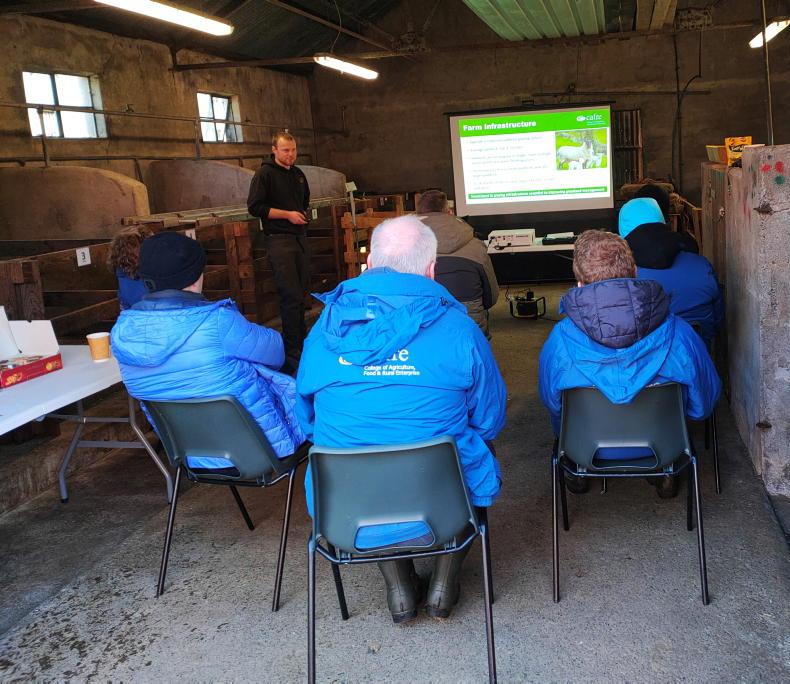
William Egerton outlines his sheep enterprise during a trial run ahead of participating in the CAFRE Technology Demonstration Farm project
The organisation does work on delivering department programmes but Martin is clear on where the line is drawn in this regard: “We don’t do the form filling, we do the knowledge provision within the scheme.
So a farmer joining an agri-environment scheme can come to one of our centres and see the options within the environmental scheme and how they would adopt that on their farm.”
Under knowledge and advisory, CAFRE run a discussion group model that has over 3000 farmers involved. There are a number of strands to this.
The family farm key skills is a broad approach in that farmers can dip in and out on the training by attending an event on the environment, animal health or business.
The groups however are for six years during which a farmer will do a development plan, benchmarking, host a visit, share data and participate in peer-to-peer learning.
The organisation has technology demonstration farms and agricultural European Innovation Partnership (EIPs) but also farm innovation visits.
This latter initiative saw groups of farmers travelling to the EU to see innovation on farms or in research organisations. Those who travel then disseminate what they learn through the groups.
BREXIT impact
With BREXIT, agricultural policy is devolved to Northern Ireland. Following consultation earlier this year, there are now 14 work streams, suckler cow, basic payment etc, four of which CAFRE will lead on, including knowledge transfer and innovation.
Martin outlines how, although things have changes in terms of the relationship with the EU, “all the programmes, innovation partnerships, visits, discussion groups, knowledge transfer will be worked up within this new policy, which has to be in place for the start of 2024.”
His view is that: “It brings control back, we can’t blame Europe anymore for any of the initiatives because they’ll sit here. Policy development and the policy delivery will happen in Northern Ireland.
In theory, we should be able to move at a quicker pace. And it does bring opportunities.”
However, he is conscious that a lot of good things were done previously under EU schemes and they would like to continue and build on that particularly in relation to the environment.
The secret to the new policy environment is going to be linking all the parts together.
“I think in five years’ time, we’ll have to link knowledge to environmental outcome. Support farmers to put new technology on farm, become a demo farm while drawing some funding to do that,” says Martin.
Food technology
Head of Food Technology, Peter Simpson notes that education and training is provided to circa 300 companies a year, from multinationals to artisans with 180 technology adoption interventions completed.
Peter explains; “this technical advice can be around quality systems, product development, process development and increasingly now around sustainability.
We are looking at renewable packaging, how to work with less people using robotics and using food as a vehicle for health when we reformulate products.
Next phase
In mid-2023, Martin hopes they will be breaking ground on new capital investment projects with £30-35 million to be spent in Greenmount and £40-45m in Loughry.
The AFBI food research component is migrating to the CAFRE Loughry platform which will create a food hub for the Northern Ireland food industry.
The Government, Martin says, is very supportive of the development as they can bring inward investors to visit the new facilities and show them: “Here’s what underpins the food industry. Here’s the graduates, here’s the development, here’s the research”.
Sustainability
The college for 10 years has held a UK accreditation – the leaf mark [linking environment and farming]. Martin believes this to be important as their policy work over the next number of years is all going to be linked to sustainability and environment.
“It’s important to have external accreditation as your baseline in terms of your environmental sustainability standards and then you can demonstrate off that.
The environmental agenda is top down but we would feed into a lot of policy and lead some of the policy. The department is leaning quite heavily on us from a technical perspective.”
However, he acknowledges the fine line between leading and being too far reaching.
“We’re being challenged all the time to be three to five years ahead of the industry, research should be 10 years ahead. We should be taking some of the risks for the industry, whether it’s the food industry, agricultural industry or the equine industry, that’s the Government role.”
• 400 staff
• Budget of €26 million.
• 1880 students
• Three campuses (Greenmount, Loughry and
Enniskillen)
• 10,000 people supported in industry.
• 4000 food technology queries annually
Three colleges came together to form CAFRE. Loughry college opened in 1908, Greenmount in 1912 and Enniskillen in 1967.
So historically, the organisation is over 100 years in the making. For those familiar with how Teagasc provide education the CAFRE model is similar, but the college director Martin McKendry explains, there is no research and CAFRE are within Government.
The staff are civil servants sitting within the food and farming group of the Department of Agriculture, Environment and Rural Affairs (DAERA). Their role is in the provision of education to young people, farmers and the food industry.
What do CAFRE do?
Martin believes that Government is all about changing behaviour and there are three ways to do that; regulation, incentive or the provision of knowledge.
“We deliver knowledge to young people entering the industry through further and higher education. We provide knowledge transfer (KT) and innovation to farmers and those working in the industry.”
College education
The college delivers courses from level two (equivalent to the junior cert) up to honours degree – the latter awarded and delivered in conjunction with one of the universities.
Courses at Greenmount include land based engineering, horticulture, food and floristry and veterinary nursing. Loughry has food technology, food business management, packaging, as well as a master’s in rural business.

Martin McKendry College Director outlines the workd of the colleges 400 staff.
Enniskillen is horse care and farriery and agriculture on a part time basis. The college is particularly proud of its links with industry and the bursaries that flow from those relationships. Martin considers this a measure of success.
“We measure ourselves in terms of [getting] people into work, into jobs. We have 59 organisations delivering student bursaries. From Godolphin on the equine side to the food industry, ABP, Dale farm and agriculture Thompson’s and the Irish Farmers Journal and the Ulster Farmers Union.
It’s not just the £1000 bursary but the vast majority of these now offer a work placement along with it.”
Learner support
A new initiative, headed up by Fiona Dickson, head of learner services, commenced last year. This is to support the student experience while at college and after.
Fiona picks up: “This is everything from students seeking referrals or if they have any special requirements but also mental health and wellbeing, counselling and support to students when they are studying.

Fiona Dickson, head of Learner Services supports the student experience while at college and after.
“We do prepare our students to make sure that they have the right resilience skills and qualities to survive working in industry.”
Martin concurs: “We say your career doesn’t start when you graduate. Your career started when you came to CAFRE because you actually said you were interested in agriculture, food and horticulture.”
Farm support
The agricultural advisers are based across Northern Ireland. In terms of KT, Greenmount has a 2,500 acre hill farm where a lot of the agri-environment, development, technology and education work is done.
Any research delivered on the CAFRE platform is through Queen’s, Ulster University and the Agri-Food and Biosciences Institute (AFBI).
The estate has a 200 cow dairy unit, 80 suckler cows and 200 ewes with a further 100 cows and 1100 ewes on the hill farm.

William Egerton outlines his sheep enterprise during a trial run ahead of participating in the CAFRE Technology Demonstration Farm project
The organisation does work on delivering department programmes but Martin is clear on where the line is drawn in this regard: “We don’t do the form filling, we do the knowledge provision within the scheme.
So a farmer joining an agri-environment scheme can come to one of our centres and see the options within the environmental scheme and how they would adopt that on their farm.”
Under knowledge and advisory, CAFRE run a discussion group model that has over 3000 farmers involved. There are a number of strands to this.
The family farm key skills is a broad approach in that farmers can dip in and out on the training by attending an event on the environment, animal health or business.
The groups however are for six years during which a farmer will do a development plan, benchmarking, host a visit, share data and participate in peer-to-peer learning.
The organisation has technology demonstration farms and agricultural European Innovation Partnership (EIPs) but also farm innovation visits.
This latter initiative saw groups of farmers travelling to the EU to see innovation on farms or in research organisations. Those who travel then disseminate what they learn through the groups.
BREXIT impact
With BREXIT, agricultural policy is devolved to Northern Ireland. Following consultation earlier this year, there are now 14 work streams, suckler cow, basic payment etc, four of which CAFRE will lead on, including knowledge transfer and innovation.
Martin outlines how, although things have changes in terms of the relationship with the EU, “all the programmes, innovation partnerships, visits, discussion groups, knowledge transfer will be worked up within this new policy, which has to be in place for the start of 2024.”
His view is that: “It brings control back, we can’t blame Europe anymore for any of the initiatives because they’ll sit here. Policy development and the policy delivery will happen in Northern Ireland.
In theory, we should be able to move at a quicker pace. And it does bring opportunities.”
However, he is conscious that a lot of good things were done previously under EU schemes and they would like to continue and build on that particularly in relation to the environment.
The secret to the new policy environment is going to be linking all the parts together.
“I think in five years’ time, we’ll have to link knowledge to environmental outcome. Support farmers to put new technology on farm, become a demo farm while drawing some funding to do that,” says Martin.
Food technology
Head of Food Technology, Peter Simpson notes that education and training is provided to circa 300 companies a year, from multinationals to artisans with 180 technology adoption interventions completed.
Peter explains; “this technical advice can be around quality systems, product development, process development and increasingly now around sustainability.
We are looking at renewable packaging, how to work with less people using robotics and using food as a vehicle for health when we reformulate products.
Next phase
In mid-2023, Martin hopes they will be breaking ground on new capital investment projects with £30-35 million to be spent in Greenmount and £40-45m in Loughry.
The AFBI food research component is migrating to the CAFRE Loughry platform which will create a food hub for the Northern Ireland food industry.
The Government, Martin says, is very supportive of the development as they can bring inward investors to visit the new facilities and show them: “Here’s what underpins the food industry. Here’s the graduates, here’s the development, here’s the research”.
Sustainability
The college for 10 years has held a UK accreditation – the leaf mark [linking environment and farming]. Martin believes this to be important as their policy work over the next number of years is all going to be linked to sustainability and environment.
“It’s important to have external accreditation as your baseline in terms of your environmental sustainability standards and then you can demonstrate off that.
The environmental agenda is top down but we would feed into a lot of policy and lead some of the policy. The department is leaning quite heavily on us from a technical perspective.”
However, he acknowledges the fine line between leading and being too far reaching.
“We’re being challenged all the time to be three to five years ahead of the industry, research should be 10 years ahead. We should be taking some of the risks for the industry, whether it’s the food industry, agricultural industry or the equine industry, that’s the Government role.”
• 400 staff
• Budget of €26 million.
• 1880 students
• Three campuses (Greenmount, Loughry and
Enniskillen)
• 10,000 people supported in industry.
• 4000 food technology queries annually







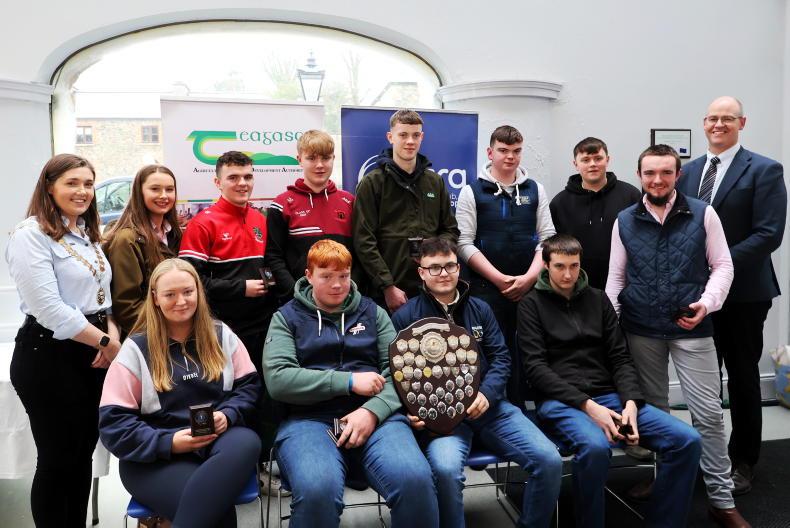
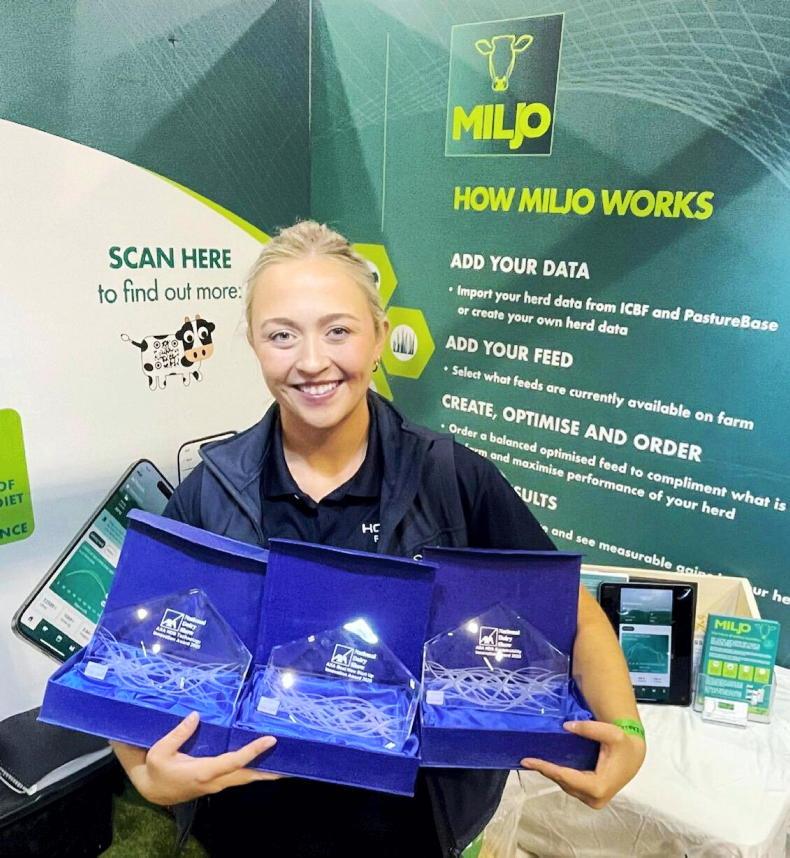


SHARING OPTIONS